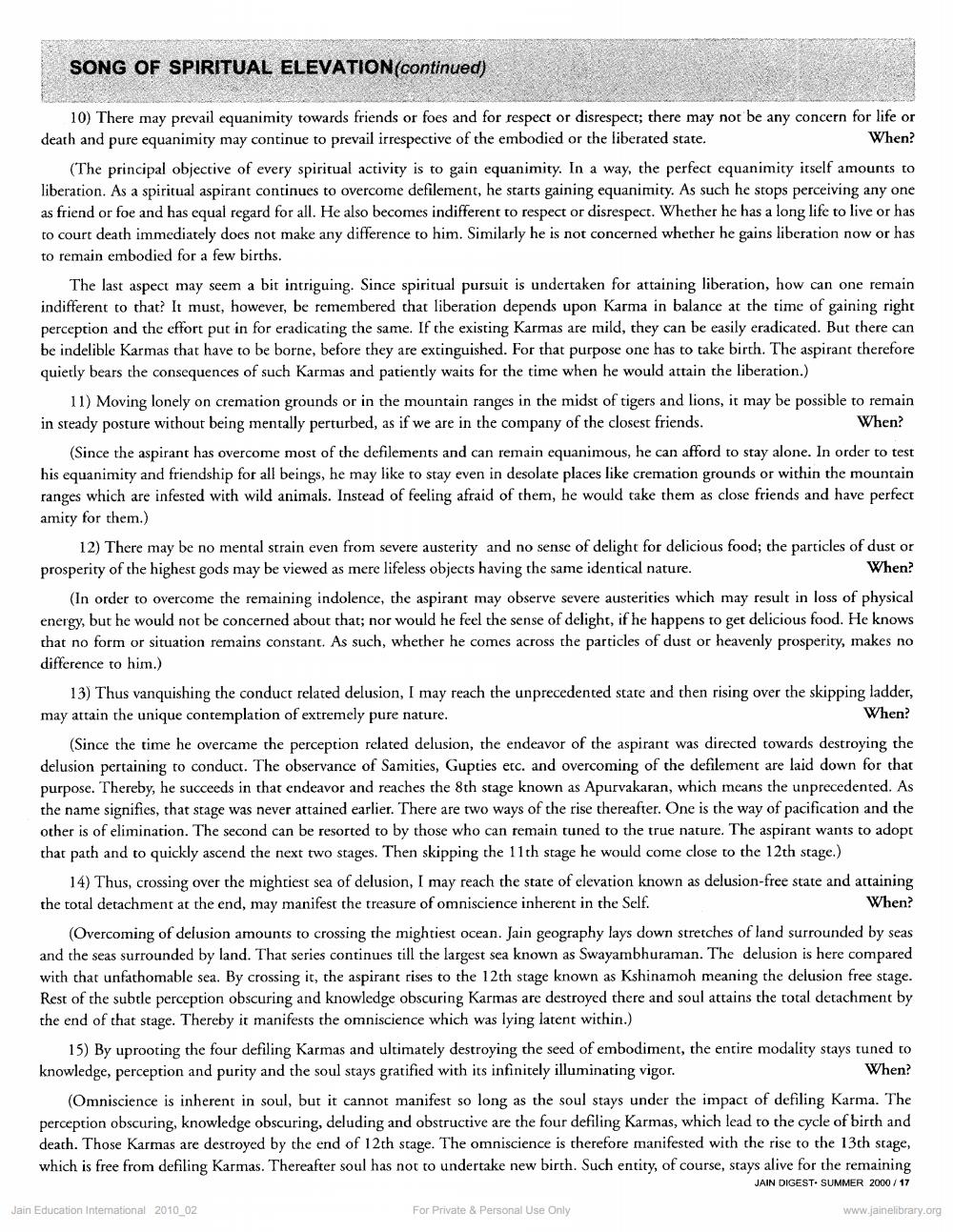________________
SONG OF SPIRITUAL ELEVATION (continued)
10) There may prevail equanimity towards friends or foes and for respect or disrespect; there may not be any concern for life or death and pure equanimity may continue to prevail irrespective of the embodied or the liberated state. When?
(The principal objective of every spiritual activity is to gain equanimity. In a way, the perfect equanimity itself amounts to liberation. As a spiritual aspirant continues to overcome defilement, he starts gaining equanimity. As such he stops perceiving any one as friend or foe and has equal regard for all. He also becomes indifferent to respect or disrespect. Whether he has a long life to live or has to court death immediately does not make any difference to him. Similarly he is not concerned whether he gains liberation now or has to remain embodied for a few births.
The last aspect may seem a bit intriguing. Since spiritual pursuit is undertaken for attaining liberation, how can one remain indifferent to that? It must, however, be remembered that liberation depends upon Karma in balance at the time of gaining right perception and the effort put in for eradicating the same. If the existing Karmas are mild, they can be easily eradicated. But there can be indelible Karmas that have to be borne, before they are extinguished. For that purpose one has to take birth. The aspirant therefore quietly bears the consequences of such Karmas and patiently waits for the time when he would attain the liberation.)
11) Moving lonely on cremation grounds or in the mountain ranges in the midst of tigers and lions, it may be possible to remain in steady posture without being mentally perturbed, as if we are in the company of the closest friends. When?
(Since the aspirant has overcome most of the defilements and can remain equanimous, he can afford to stay alone. In order to test his equanimity and friendship for all beings, he may like to stay even in desolate places like cremation grounds or within the mountain ranges which are infested with wild animals. Instead of feeling afraid of them, he would take them as close friends and have perfect amity for them.)
12) There may be no mental strain even from severe austerity and no sense of delight for delicious food; the particles of dust or prosperity of the highest gods may be viewed as mere lifeless objects having the same identical nature. When?
(In order to overcome the remaining indolence, the aspirant may observe severe austerities which may result in loss of physical energy, but he would not be concerned about that; nor would he feel the sense of delight, if he happens to get delicious food. He knows that no form or situation remains constant. As such, whether he comes across the particles of dust or heavenly prosperity, makes no difference to him.)
13) Thus vanquishing the conduct related delusion, I may reach the unprecedented state and then rising over the skipping ladder, may attain the unique contemplation of extremely pure nature. When?
(Since the time he overcame the perception related delusion, the endeavor of the aspirant was directed towards destroying the delusion pertaining to conduct. The observance of Samities, Gupties etc. and overcoming of the defilement are laid down for that purpose. Thereby, he succeeds in that endeavor and reaches the 8th stage known as Apurvakaran, which means the unprecedented. As the name signifies, that stage was never attained earlier. There are two ways of the rise thereafter. One is the way of pacification and the other is of elimination. The second can be resorted to by those who can remain tuned to the true nature. The aspirant wants to adopt that path and to quickly ascend the next two stages. Then skipping the 11th stage he would come close to the 12th stage.)
14) Thus, crossing over the mightiest sea of delusion, I may reach the state of elevation known as delusion-free state and attaining the total detachment at the end, may manifest the treasure of omniscience inherent in the Self. When?
(Overcoming of delusion amounts to crossing the mightiest ocean. Jain geography lays down stretches of land surrounded by seas and the seas surrounded by land. That series continues till the largest sea known as Swayambhuraman. The delusion is here compared with that unfathomable sea. By crossing it, the aspirant rises to the 12th stage known as Kshinamoh meaning the delusion free stage. Rest of the subtle perception obscuring and knowledge obscuring Karmas are destroyed there and soul attains the total detachment by the end of that stage. Thereby it manifests the omniscience which was lying latent within.)
15) By uprooting the four defiling Karmas and ultimately destroying the seed of embodiment, the entire modality stays tuned to knowledge, perception and purity and the soul stays gratified with its infinitely illuminating vigor. When?
(Omniscience is inherent in soul, but it cannot manifest so long as the soul stays under the impact of defiling Karma. The perception obscuring, knowledge obscuring, deluding and obstructive are the four defiling Karmas, which lead to the cycle of birth and death. Those Karmas are destroyed by the end of 12th stage. The omniscience is therefore manifested with the rise to the 13th stage, which is free from defiling Karmas. Thereafter soul has not to undertake new birth. Such entity, of course, stays alive for the remaining
JAIN DIGEST. SUMMER 2000/17
Jain Education Intemational 2010_02
For Private & Personal Use Only
www.jainelibrary.org




